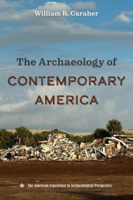The Archaeology of American Medicine and Healthcare
In this book, Meredith Reifschneider synthesizes archaeological research on healthcare and medicine to show how practices in the United States have evolved since the nineteenth century, demonstrating that historical archaeology can provide important insights into healthcare and modes of self-care in the past.
The Historical Archaeology of the Pacific Northwest
In this book, Douglas Wilson uses historical documents, Indigenous oral traditions, and the material record to provide a comprehensive overview of the historical archaeology of the Pacific Northwest region from the seventeenth through the twenty-first centuries.
The Archaeology of Contemporary America
This book provides a survey of contemporary archaeology in the United States, demonstrating the plurality of theoretical and methodological approaches that make this discipline in the US unique.
The Archaeology of the Homed and the Unhomed
The first comprehensive discussion of the historical archaeology of homelessness, this book highlights the social complexities, ambiguities, and significance of the home and the unhomed in the archaeological record.
The Archaeology of Craft and Industry
In this expansive yet concise survey, Christopher Fennell discusses archaeological research from sites across the United States that once manufactured, harvested, or processed commodities, uncovering key insights into American history.
The Archaeology of the Logging Industry
In this book, John Franzen surveys archaeological studies of logging sites across the nation from the nineteenth and twentieth centuries, explaining how material evidence found at these locations illustrates key aspects of the American experience during this era.
The Archaeology of Southeastern Native American Landscapes of the Colonial Era
This volume describes the ways Native American populations accommodated and resisted the encroachment of European powers in southeastern North America from the arrival of Spaniards in the sixteenth century to the first decades of the American Republic. Tracing changes to the region’s natural, cultural, social, and political environments, Charles Cobb provides an unprecedented survey of the landscape histories of Indigenous groups across this critically important area and time period.
The Archaeology of Prostitution and Clandestine Pursuits
The Archaeology of Prostitution and Clandestine Pursuits synthesizes case studies from various nineteenth-century sites where material culture reveals evidence of prostitution, including a brothel in Five Points, New York City’s most notorious neighborhood, and parlor houses a few blocks from the White House and Capitol Hill.
The Archaeology of Northern Slavery and Freedom
Excavations at cities including New York and Philadelphia reveal that slavery was a crucial part of the expansion of urban life as late as the 1840s. The case studies in this book also show that enslaved African-descended people frequently staffed suburban manor houses and agricultural plantations. Moreover, for free blacks, racist laws such as the Fugitive Slave Act of 1850 limited the experience of freedom in the region. Delle explains how members of the African diaspora created rural communities of their own and worked in active resistance against the institution of slavery.
The Archaeology of American Childhood and Adolescence
This is the first book to focus on archaeological evidence from the recent past related to children, childhood, and adolescence. Jane Baxter, a foremost authority on the archaeology of historic American childhood, synthesizes the growing variety of ways researchers have been approaching the topic, guiding readers through an abundance of current data on the experiences of children in American history.














